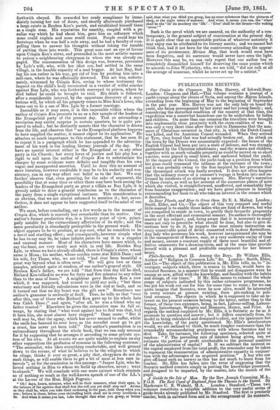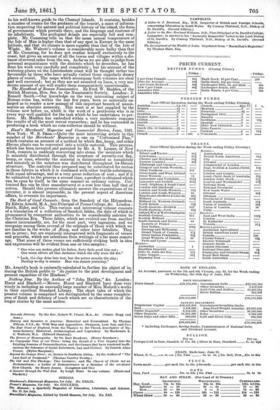against Ruy Lyle, who was forthwith conveyed to prison, where
he Our Cruise in the Claymore. By Mrs. Harvey, of Ickwell-Bury. died before he could be brought to trial. His death is followed, London : Chapman and Hall.—This volume contains a journal of a after a considerable interval, by the opportune discovery of a mys- yacht-voyage along the shores of Syria, and among the .1E.eau Islands, terious will, by which all his property comes to Miss Ken's lover, who extending from the beginning of May to the beginning of September turns out to be a son of Mrs. Lyle by a former marriage. in the past year. Mrs. Harvey was not the only lady on board the Incredible as it may seem, it is this impossible villain whom the yacht, she being accompanied by her sister and her young family ; and, author of Crispin Ken presents to us as a fair sample of the leaders of considering the disturbed condition of the country at that time, the expedition was a somewhat hazardous one to be undertaken by ladies the Evangelical party of the present day. That so astounding a
and children. On more than one occasion the travellers were brought revelation may excite surprise in certain quarters, he is quite pre- into unpleasantly close proximity with the stern realities of war. It pared to admit ; but he distinctly asserts that the character is drawn was only a very short time after their visit to Damascus that the mas- from the life, and observes that " as the Evangelical platform happens sacre of Christians occurred in that city, in which the Dutch Consul to have supplied the matter, it cannot object to its application." He was killed, and the American Consul wounded. When they arrived attaches so much importance to this statement, that lie has seen fit at Tyre, they found that war had actually broken out. An attack on to repeat it in a paragraph which he has appended to the advertise- the town by the Druses was momentarily expected : the house of the meat of his work in the leading literary journals of the day. We English Consul had been put into a state of defence, and was strongly have no special interest either in the Evangelical or in any other garrisoned by the Christian inhabitants ; and the women and children, party in the Church ; but every lover of justice and fair play has a together with as much valuable property as couldbe moved on so short right to call upon the author of Crispin Ken to substantiate his a notice, were placed in small boats, and anchored behind the yacht. charges by some evidence more definite and tangible than his own At the request of the Consul, the yacht took up a position from which vague and unsupported assertion. Until he dces this no amount of her guns could command the isthmus at the entrance of the town ; and it was probably owing to the fear inspired by her presence that mere iteration, However creditable it may be to his audacity and con- the threatened attack was finally averted. It does not often happen sistency, can in any way affect our belief as to the fact. We may that the ordinary course of a summer's voyage is broken into and en- further observe that, even granting, for the sake of argument, the livened by incidents of so stirring a nature. Mrs. Harvey's narrative possibility that at some time or other there may have been among the of these events, as well as her account of the numerous places of note leaders of the Evangelical party as great a villain as Ruy Lyle, it is which she visited, is straightforward, unaffected, and remarkably free grossly unfair to draw a general conclusion as to the character of from feminine exaggeration ; and we have great pleasure in heartily the party from a single exceptional instance. This consideration is recommending her book to all who take an interest in the scenes which so obvious, that we are almost ashamed to mention it ; but, never- it describes.
theless, it does not appear to have suggested itself to the mind of our In-Door Plants, and How to Grow them. By E. A. Maling. London :
author. Smith, Elder, and Co.—The object of this very compact and useful We must, before concluding, say a few words as to the manner of little manual is to enable those ladies who are fond of flowers, but who
are compelled to reside in town, .to gratify their favourite propensity Crispin Ken, which is scarcely less remarkable than its matter. Oar in the most effectual and economical manner. Its author is thoroughly author's former production was, in a literary point of view, princi- master of his subject; and, being aware that it is necessary in many pally notable for the extraordinary affectation of its style ; and the cases not only to prescribe what should be done, but also to give di- same peculiarity is abundantly perceptible in the present work. His rections how to do it, he imparts the most minute instruction on object appears to be to produce, at any cost, what lie considers to be every conceivable point of detail connected with in-door floriculture. a novel and startling. effect ; and consequently, however simple what Any lady who possesses his work, however inexperienced she may be he has to say may be, he takes infinite pains to say it in a singular ih the management of flowers, may, at a very moderate outlay of time and unusual manner. Most of his characters have names whith, to and money, ensure a constant supply of these most beautiful and ef- say the least, are very rarely met with in real life. Besides Ruy festive ornaments for a drawing-room, and at the same time provide Lyle, to whom we have already alluded, there is Crispin's sister, whose herself with a pleasant and profitable employment for her leisure name is Mona ; his mother, whose maiden name was Edith Dane ; and hours. his wife, Ivy Thane, who, we are told, "had ever been beautiful a .Philo-Socrates. Part II. Among the Boys. By William Ellis, Author of " Religion in Common Life," &c. London : Smith, Elder, great way beyond what is often seen." We will give two or three and Co.—The object of this publication is, Mr. Ellis tells, us,
former, of these two extremes, being, in fact, Labour-selling, Labour-
to his well-known guide to the Channel Islands. It contains, besides a number of routes for the guidance of the tourist, a mass of informa- tion respecting the natural and political history of the island, the form of government which prevails there, and the language and customs of its inhabitants. The geological details are especially full and com- plete. Mr. Cumn* tells us that the mean annual temperature of the Isle of Man is higher than that of any spot in Europe in the same latitude, and that its climate is more equable than that of the Isle of Wight. Mr. Walcott's volume is considerably more bulky than that of Mr. Cumming, for he does not confine himself exclusively to the coast, but gives an account of all the towns and villages within a dis- tance of several miles from the sea. As far as we are able to judge from personal acquaintance with the districts which he describes, he has done his work very carefully and completely ; but his account of the watering-places on the Lincolnshire coast will be thought rather too favourable by those who have actually visited those singularly dreary places of resort. The maps which accompany both volumes are clear and well executed; but as they are not mounted on linen, a very mo- derate amount of use will render them comparatively unserviceable. The Handbook of Roman Numismatics. By Fred. W. Madden, of the British Museum, Hon. Sec. to the Numismatic Society. London : J. Russell Smith.—Our knowledge on the very interesting subject of Roman coins has, within the last few years, been so materially en- larged as to render a new manual of this important branch of numis- matics an absolute necessity. This want is at last supplied by the volume now before us, which is the work of a gentleman who is in every way well qualified for the task which he has undertaken to per- form. Mr. Madden has embodied within a very moderate compass the results of all the most recent researches; and he has succeeded in producing a book which no coin-collector should be without.
Humes Merchant? Magazine and Commercial Review, June,. 1861. New York: W. B. Dana.—Quite the most interesting article in this number of the Merchants' Magazine is one on " Cottonized Flax," which contains an account of a method by which flax, hemp, and other fibrous plants can be converted into a textile material. This process, which has been invented and patented by Mr. A. S. Lyman, of New York, consists in suddenly converting into steam the' moisture which is minutely distributed through the structure of recently-cut flax, hemp, or cane, whereby the material is disintegrated as completely and minute] T as the moisture was distributed throughout its fibrous structure. The material thus prepared may be substituted for cotton in those fabrics in which it is combined with other textile substances, with equal advantage, and at a very great reduction of cost; and if it be submitted to the process a second time, a product is obtained which can be spun by itself, in the same manner as ordinary, cotton. Cot- tonized flax can be thus manufactured at a cost less than half that of cotton. Should this process ultimately answer the expectations of its inventor, it is almost impossible, in the present aspect of American affairs, to overrate its importance.
The Book of Good Counsels: from the Sanskrit of the Hitopadesa. By Edwin Arnold, M.A., late Principal of Poona College, &c. London : Smith, Elder, and Co. This curious and interesting volume consists of a translation of a collection of Sanskrit fables, the date of which is pronounced by competent authorities to be considerably anterior to the Christian Era. These fables, which are evolved one from another almost interminably, are, for the most part very ingenious, and we
recognize among them several of the originals of those with which we are familiar in the works of Esop, and other later fabulists. They are in prose; but are copiously interspersed with fragments of verses and proverbs, which are selections from writings of a far more remote age. That some of these verses are sufficiently striking both in idea and expression will be evident from one or two samples :
" One wise son makes glad his father, forty fools avail him not; One moon silvers all that darkness which the silly stars did dot."
" Look, the clay dries into iron, but the potter moulds the clay; Destiny to-day is master. Man was master yesterday."
Mr. Arnold's book is eminently, calculated to further his object of in- ducing the British public to " do justice to the past development and present capacities of the Hindoos."
Nothing New. By the Author of "John Halifax," &c. London: Hurst and Blackett.—Messrs. Hurst and Blackett have done very wisely in including an unusually large number of Miss Muloch's works in their excellent Standard Library. The short tales of which the present volume is comprised are distinguished by the same complete- ness of finish and delicacy of touch which are so characteristic of the longer stories by the same author.































 Previous page
Previous page